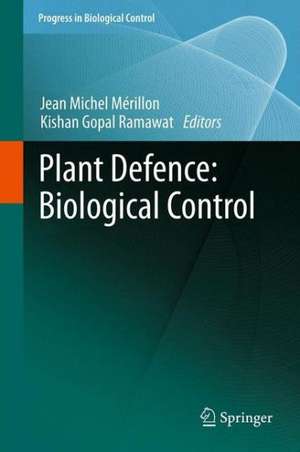Plant Defence: Biological Control: Progress in Biological Control, cartea 12
Editat de Jean Michel Mérillon, Kishan Gopal Ramawaten Limba Engleză Hardback – 4 oct 2011
Din seria Progress in Biological Control
- 18%
 Preț: 952.57 lei
Preț: 952.57 lei - 18%
 Preț: 1222.01 lei
Preț: 1222.01 lei - 18%
 Preț: 1381.58 lei
Preț: 1381.58 lei - 18%
 Preț: 956.33 lei
Preț: 956.33 lei - 15%
 Preț: 632.19 lei
Preț: 632.19 lei - 24%
 Preț: 1054.23 lei
Preț: 1054.23 lei - 15%
 Preț: 657.25 lei
Preț: 657.25 lei - 15%
 Preț: 649.06 lei
Preț: 649.06 lei - 18%
 Preț: 1412.20 lei
Preț: 1412.20 lei - 18%
 Preț: 942.76 lei
Preț: 942.76 lei - 24%
 Preț: 797.39 lei
Preț: 797.39 lei - 18%
 Preț: 1117.03 lei
Preț: 1117.03 lei - 18%
 Preț: 948.16 lei
Preț: 948.16 lei - 15%
 Preț: 652.17 lei
Preț: 652.17 lei - 15%
 Preț: 653.14 lei
Preț: 653.14 lei - 18%
 Preț: 956.81 lei
Preț: 956.81 lei - 18%
 Preț: 1234.77 lei
Preț: 1234.77 lei - 18%
 Preț: 936.29 lei
Preț: 936.29 lei - 18%
 Preț: 1225.94 lei
Preț: 1225.94 lei
Preț: 955.25 lei
Preț vechi: 1164.93 lei
-18% Nou
Puncte Express: 1433
Preț estimativ în valută:
182.81€ • 190.15$ • 150.92£
182.81€ • 190.15$ • 150.92£
Carte tipărită la comandă
Livrare economică 15-29 aprilie
Preluare comenzi: 021 569.72.76
Specificații
ISBN-13: 9789400719323
ISBN-10: 9400719329
Pagini: 424
Ilustrații: XII, 412 p.
Dimensiuni: 155 x 235 x 28 mm
Greutate: 0.73 kg
Ediția:2012
Editura: SPRINGER NETHERLANDS
Colecția Springer
Seria Progress in Biological Control
Locul publicării:Dordrecht, Netherlands
ISBN-10: 9400719329
Pagini: 424
Ilustrații: XII, 412 p.
Dimensiuni: 155 x 235 x 28 mm
Greutate: 0.73 kg
Ediția:2012
Editura: SPRINGER NETHERLANDS
Colecția Springer
Seria Progress in Biological Control
Locul publicării:Dordrecht, Netherlands
Public țintă
ResearchCuprins
Section: A general biology of parasitism.- 1. Co-evolution of pathogens, mechanism involved in pathogenesis and biocontrol of plant diseases: an overview.- Section: B Applications of biological and natural agents.- 2. Stilbenes: biomarkers of grapevine resistance to disease of high relevance for agronomy, oenology and human health.- 3. Alternatives to synthetic fungicides using small molecules of natural origin.- 4. Fungi as biological control agents of plant-parasitic nematodes.- 5. Secondary metabolites and plant defence .- 6. Trends for commercialization of biocontrol agent (biopesticide) products.- 7. The Role of Indigenous Knowledge in Biological Control of Plant Pathogens: Logistics of New Research Initiatives.- 8. Plant chemicals in post harvest technology for management of fungal, mycotoxin and insect contamination of food commodities.- 9. Ganoderma diseases of woody plants of Indian arid zone and their biological control.- 10. Plant defence against heavy metal stress.- Section : C Host parasite interaction.- 11. Gall phenotypes – product of plant cells defensive responses to the inducers attack.- 12. The role of roots in plant defence.- Section :D Mechanism and signal transduction.- 13. Activation of grapevine defense mechanisms: theoretical and applied approaches.- 14. Plant cyclotides: an unusual protein family with multiple functions.- 15. Methyl jasmonate as chemical elicitor of induced responses and anti-herbivory resistance in young conifer trees.- 16. Pathogen-responsive cis-elements.- 17. Pathogenesis Related Proteins in Plant Defense Response.
Textul de pe ultima copertă
With ever increasing human population, demand for food, feed and fodder is continuously increasing. Diseases by insect pests, pathogens and animal pests are responsible for heavy crop losses and reduced food supplies, poorer quality of agricultural products, economic hardship for growers and processor. For many diseases, traditional chemical control methods are not neither always economical nor are they effective and may have unwanted health, safety and environmental risks. Biological control involves use of beneficial microorganism, such as specialised fungi and bacteria to attack and control plant pathogens and diseases they cause. Biological control offers an environmental friendly approach to the management of plant diseases and can be incorporated in to cultural and physical controls and limited chemical uses for an effective integrated pest management system. There is a renewed interest in the use of efficient, economical and environment friendly botanicals and biological control agents for crop protection. This book provides a comprehensive account of interaction of host with its pathogens, induced resistance, development of biological control agents for practical applications in crops and trees, the underlying mechanism and signal transduction. The book has following sections:
The book is useful for undergraduates, post graduates and scientists studying crop protection, agricultural sciences, applied entomology, plant pathology, plant sciences, biotechnology, forestry, post harvest technology, crop management and environmental sciences as well as agrochemical and crop protection industries.
.
- General biology of parasitism
- Applications of biological and natural agents for disease resistance
- Host parasite interaction
- Mechanism of defence
The book is useful for undergraduates, post graduates and scientists studying crop protection, agricultural sciences, applied entomology, plant pathology, plant sciences, biotechnology, forestry, post harvest technology, crop management and environmental sciences as well as agrochemical and crop protection industries.
.
Caracteristici
Covering gamut of biocontrol Practical and environmental friendly approach to disease control Useful for temperate to subtropical plants
